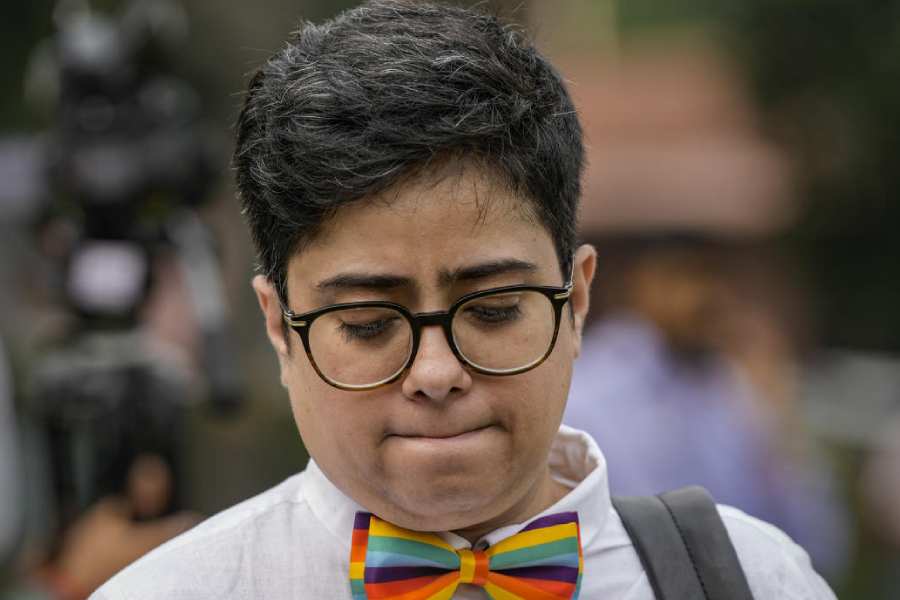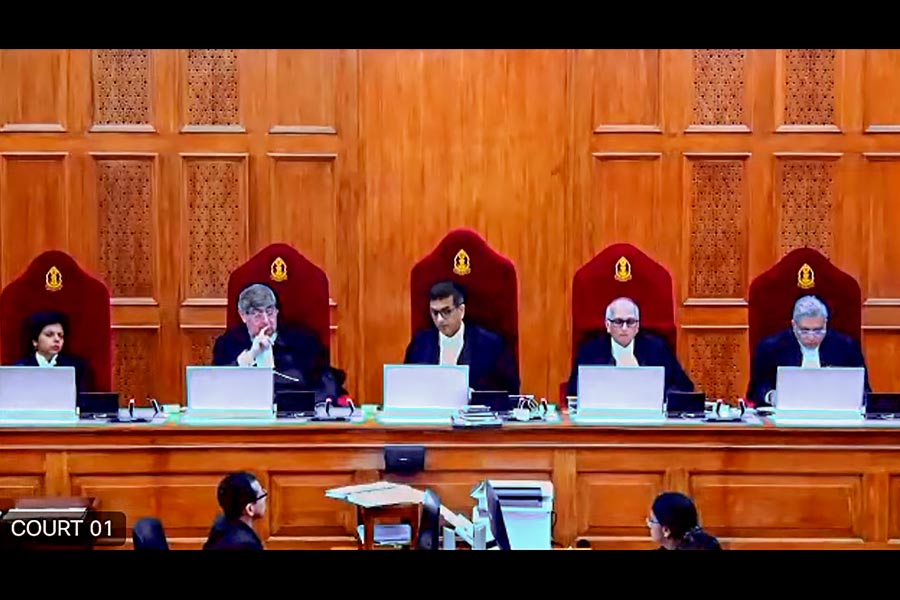A five-judge constitution bench of the Supreme Court by a 3:2 majority on Tuesday refused to accord legal recognition to same-sex marriage and said only Parliament can, if necessary, confer such a right.
The majority also overruled the minority opinion that members of the LGBTQ community have the right to adoption like a heterosexual couple or parent.
However, the bench by a unanimous majority asked the Centre to expedite the process of providing legal entitlements like provident fund and pension and other such benefits in keeping with their entitlements, if any.
Chief Justice of India D.Y. Chandrachud and the second senior-most judge, Justice Sanjay Kishan Kaul, delivered the minority verdict upholding the right of the LGBTQ community to marry and saying the State had a duty to confer and protect such a right. The majority opinion of Justices Ravindra Bhat, Hima Kohli and P.S. Narasimha said only Parliament can legislate on such rights.
Since it is the majority opinion that prevails, effectively the Supreme Court has ruled that members of the LGBTQ community have no fundamental or constitutional right to marry.
Only 34 of the 194 countries recognise same-sex marriage.
The apex court passed the judgment while dealing with a batch of PILs filed by members of the LGBTQ community seeking recognition of their marriage and quashing or reading down the provisions of the Special Marriages Act, 1954, that recognise a marriage as that between a man and a woman.
CJI Chandrachud, who pronounced the minority judgment along with Justice Kaul, said at the outset that the judges had agreed on some issues and disagreed on various other matters.
The following are the conclusions of the majority opinion delivered by Justices Bhat, Kohli and Narasimha:
• There is no unqualified right to marriage except that recognised by statute including space left by custom.
• An entitlement to legal recognition of the right to union — akin to marriage or civil union, or conferring legal status upon the parties to the relationship can be only through enacted law. A sequitur of this is that the court cannot enjoin or direct the creation of such regulatory framework resulting in legal status.
• The above findings should not be read as to preclude queer persons from celebrating their commitment to each other, or relationship, in whichever way they wish, within the social realm.
• Previous judgments of the apex court, including the five-judge bench ruling decriminalising gay sex and holding that queer and LGBTQ+ couples have the right to union or relationship (under Article 21), “be it mental, emotional or sexual”, flowing from the right to privacy, right to choice, and autonomy, will, however, not grant them any right to claim entitlement to any legal status for the said union or relationship.
• The challenge to the SMA (Special Marriage Act) on the ground of under-classification and discrimination is not made out, hence the plea of the petitioners to read various provisions in a “gender-neutral” manner so as to enable same-sex marriage is unsustainable.
• Equality and non-discrimination are basic foundational rights. The indirect discriminatory impacts in relation to earned or compensatory benefits, or social welfare entitlements for which marital status is a relevant eligibility factor, for queer couples who in their exercise of choice form relationships, have to be suitably redressed and removed by the State.
“These measures need to be taken with expedition because inaction will result in injustice and unfairness with regard to the enjoyment of such benefits, available to all citizens who are entitled and covered by such laws, regulations or schemes (for instance, those relating to employment benefits: provident fund, gratuity, family pension, employee state insurance; medical insurance; material entitlements unconnected with matrimonial matters, but resulting in adverse impact upon queer couples),” the majority verdict said.
“As held earlier, this court cannot within the judicial framework engage in this complex task; the State has to study the impact of these policies, and entitlements.... Consistent with the statement made before this Court during the course of proceedings on 03.05.2023, the Union (government) shall set up a high-powered committee chaired by the Union Cabinet Secretary to undertake a comprehensive examination of all relevant factors.... In the conduct of such exercise, the concerned representatives of all stakeholders, and views of all states and Union Territories shall be taken into account,” the court added.
• Transgender persons in heterosexual relationships have the freedom and entitlement to marry under the existing statutory provisions.
• CARA (Central Adoption Resource Agency) and the central government should appropriately consider the realities of de facto families, where single individuals are permitted to adopt and thereafter start living in a non-matrimonial relationship.
“In an unforeseen eventuality, the adopted child in question could face exclusion from the benefits otherwise available to adopted children of married couples. This aspect needs further consideration by the authorities concerned as the court is not the appropriate forum.
• Furthermore, the State shall ensure — consistent with the previous judgments of the apex court in the K.S. Puttaswamy, Navtej Johar, Shakti Vahini and Shafin Jahan cases — that the choice exercised by queer and LGBTQ couples to cohabit is not interfered with and they do not face any threat of violence or coercion.
“All necessary steps and measures in this regard shall be taken. The respondents (State) shall take suitable steps to ensure that queer couples and transgender persons are not subjected to any involuntary medical or surgical treatment,” the majority verdict said.
• That queer couples have the right to exercise their choice, cohabit and live without disturbance is incontestable. In the same vein, that they are owed protection against any threat or coercion to their life is a positive obligation imposed on the State and its instrumentalities.











